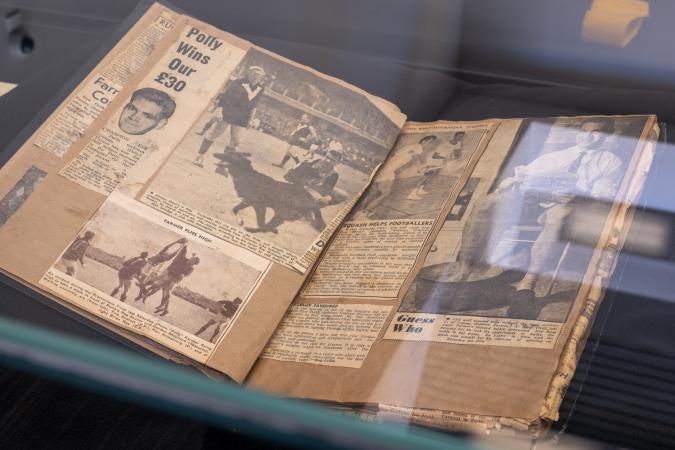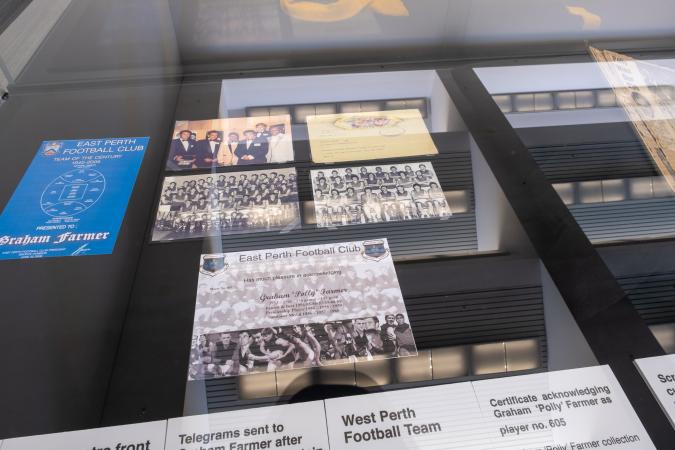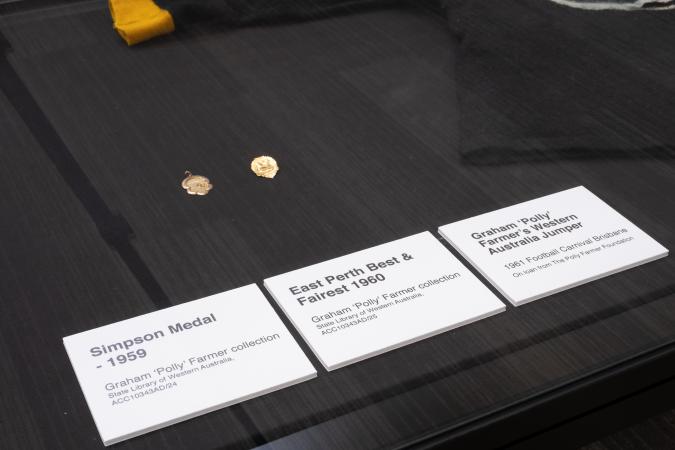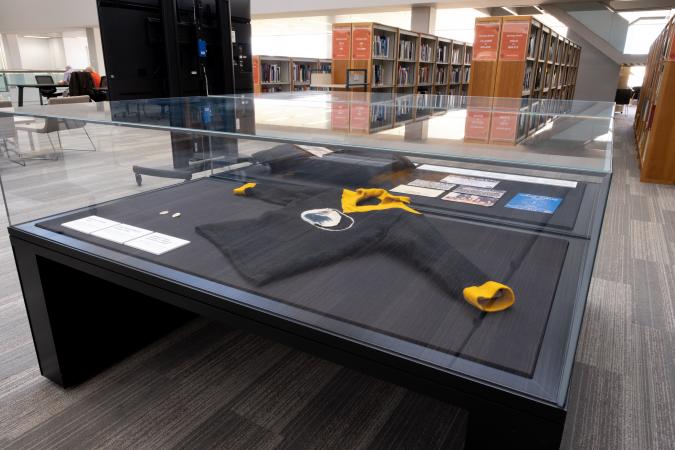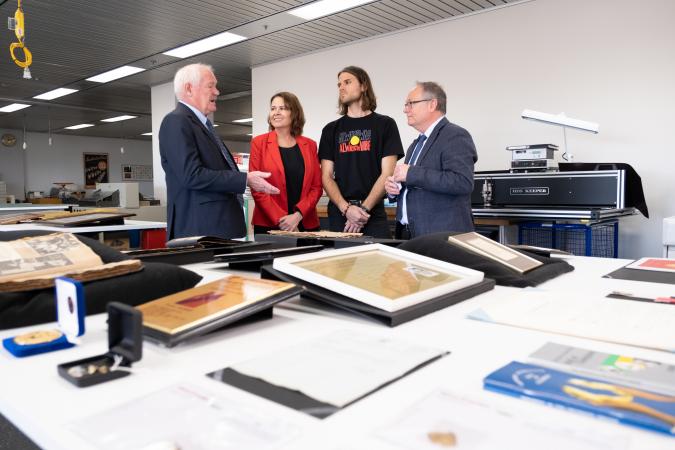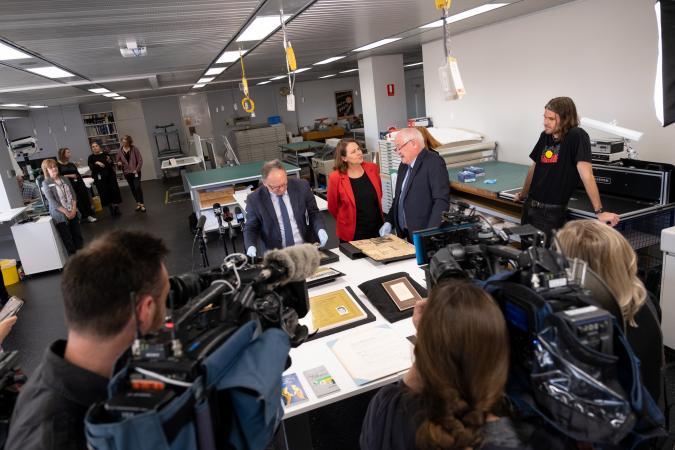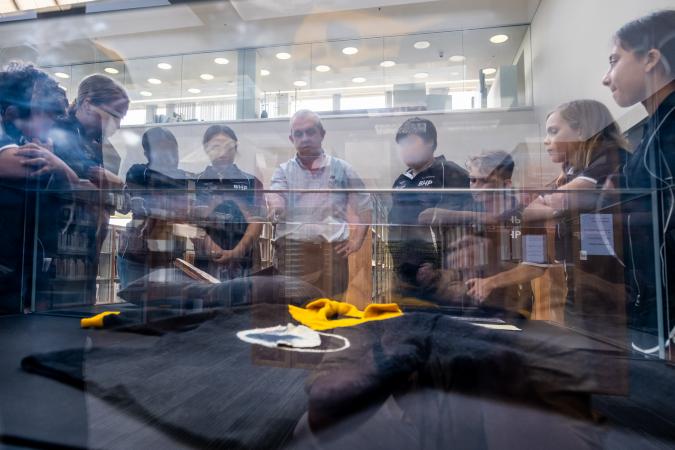Senior Subject Specialist John Hughes, delves into the newly acquired Graham "Polly" Farmer collection and the history of this extraordinary footballer, ahead of the Grand Final being held at Perth Stadium.
The State Library of Western Australia has acquired its latest treasures, a valuable collection of Graham 'Polly' Farmer memorabilia. Farmer was an Australian Rules Football player and coach known for revolutionising ruckwork and handballing.
The collection includes:
- 1960 Sandover Medal - one of the three Sandover Medals he won in his football career, accompanied by a collection of congratulatory letters and telegrams to Farmer on his win;
- 1959 Simpson Medal - with a letter from the East Perth Football Club congratulating him on winning the Medal for the 1959 Grand Final and for also winning the Club's Best and Fairest;
- 1971 Member of the British Empire medal - with certificate signed by Queen Elizabeth. Farmer was the first Australian footballer to receive a Queen's honour; and
- collection of archival materials covering Farmer's life and career, including a 1977 telegraph to Farmer from the Premier, Charles Court, wishing the Western Australian side luck in the first State of Origin match which Farmer coached.
Born in WA, Farmer spent his childhood in Sister Kate's orphanage as a member of the Stolen Generation.
He began his football career with the East Perth Football Club in 1953 and his career in football is legendary, winning five premierships in the State's competition, three Sandover Medals for fairest and best player and four Simpson Medals for best player in the Grand Final.
Farmer believed that all Aboriginal children should be able to reach their potential and established the Graham 'Polly' Farmer Foundation to help young Aboriginal people follow their dreams. The Foundation is a member of the State Library's Literacy Alliance, a group of government and non-government organisations working together to improve literacy in our communities.
The State Library will preserve this important collection and keep it safe for future generations.
Recorded on ABC Perth on 24 September 2021.
Transcript
BEGINNING OF INTERVIEW
Christine: That’s right, on History Repeated the life of one of the most decorated players in Australian football history.
[Audio recording of football match commentator]
“This kick now goes towards centre half forward. Farmer’s in that lot and Farmer’s pulling in...West Perth forcing the ball to their half forward line tapped over cleverly by Wynne to Graham Farmer...”
Christine: Polly Farmer played in three premiership teams and was seven times club Fairest and Best.
Now did you ever watch Polly Farmer play? Love to hear your memories of the AFL great.
1300 222 720 or 0437 922 720.
John Hughes is a Senior Subject Specialist from the State Library of WA. Hello John.
JH: Hi Christine.
Christine: Now I mentioned that story about Polly Farmer and you have some evidence to back it up and I’ve got a really good text but we’re going to leave it to the end of this chat because I want to find out firstly how the library got this incredible collection. How did it come to be in your hands?
JH: Well, sport probably isn’t the greatest strength of the State Library but last year, we saw an auction up in Melbourne which had some Polly Farmer material, so we bid for various bits and pieces and we actually managed to acquire quite a lot of Polly Farmer material which was really exciting.
Christine: Yes, well, that’s great. So how did Polly get the nickname?
JH: Well the nickname, there’s a few stories about that. So I was just telling you Christine that he was brought up in Sister Kate’s Children Home and at the age of seven, a group of them were sent down to Greenbushes down in South West and it was around then that he got the nickname and so the usual answer is Polly the parrot because he talked so much. There’s two alternate views and one is you call very tall people tiny, so it could be that they called him Polly because he was quite quiet and I think later on in life, he was and then one of his...one of the guys who was down there with him who kind of went through the career with him playing footy, was a guy called Ted “Square” Kilmurray. And Ted’s story is that Pol liked his food and so he pecked like a parrot so but the universal one is that he talked a lot when he was child.
Christine: So tell us about his early life. What do we know?
JH: Well he was born in Fremantle in 1935. He didn’t know his father and so by the age of two, he was sent off to Queens Park to Sister Kate’s in Queens Park and there are quite...some quite dark stories from people who came through Sister Kate’s but in a very usual Polly Farmer way, he was quite straight forward about it and he said it didn’t do any harm and it helped kind of teach him and it helped him to become the person he [be]came. So, it was... while he was progressing from Sister Kate’s, he got an apprenticeship at Winterbottom’s as a car mechanic, started playing for Maddington and he was a bit of a prodigy obviously football wise and then he started playing for East Perth and then his career went from there.
Christine: Yes, East Perth. That’s my WAFL team.
So, what is in this collection? What have you actually got?
JH: Well, the highlights really for me are...well they’re the shiny things...they’re the medals. So we’ve got a 1960 Sandover medal and that’s for being the Best and Fairest in the WAFL, the West Australian Football League. So don’t forget, in those days there wasn’t an AFL so it was the West Australian Football League or the Victorian Football League. So the Sandover medal is great and the...one of the things I like about it is, it’s a gold medal. It’s quite small but it’s shaped in the shape of a football [laughs].
Christine: Ahh [gasp].
JH: So it’s quite cute. So he got that for being the Best and Fairest and associated with that medal is we’ve got a load of telegrams. So that was in 1960 and I’m thinking you know, nowadays you do a WhatsApp or something like that or send an email. We’ve actually got telegrams. And one of the telegrams is from the guy who invented the Sandover Medal, Alfred Sandover. Well, one of the telegrams in 1960 is from his son, Eric Sandover.
So, it’s really great reading the telegrams and them all being so excited that Polly has won the Sandover Medal for being the Best and Fairest.
Christine: Congratulating him.
JH: Yes, yes, yes.
And obviously they’re now over 60 years old and really great educational tool to say, “Well before email, this is what happened”.
Christine: Yes that’s a really good point.
It’s quarter past 2.
I have John Hughes in the studios from the State Library. We’re talking about Graham Polly Farmer. It’s not the first time we’ve talked about him on air but we figured it’s a really good one going into the Grand Final tomorrow. If you’ve got any memories to share, 0437 922 720 and given it’s Grand Final weekend, how many grand finals did he play in?
JH: I think all in all he played in ten. So two of those were over in Victoria and the biggest one he played in and the one that he won over there was in 1963 so that was Geelong against Hawthorn. Geelong won by 109 points to 60. What I loved about this Christine was the Hawthorn team were coached by a very famous football identity called John Kennedy Senior and the Hawthorn team were nicknamed Kennedy’s Commandos [laughs].
Christine: [laughs]
JH: I’m not sure whether that’s Kommandos with a ‘K’. So you can imagine...well even one of the commentators of the day called it ‘hard rough game’ and the way they played in those days, that’s telling you something. So he won that Grand Final...he lost the Grand Final over there a few years later. He won...I think it was three Grand Finals with East Perth before he went over and then when he came back, because he was so well regarded he became not just captain but coach of West Perth. So he went to the other side so to speak and he won two Grand Finals with them. So he wasn’t just an amazing player. You would know he was a ruck man, but he also galvanised teams to success and I think that is what we get is that he was a larger than life character in more ways than one
Christine: What do we know about his personality?
JH: Well you can go on YouTube and you can see interviews with him and he was, as I said at the beginning, he was slightly taciturn but just a really charming gentleman. He just sounded such a level headed nice guy. And that comes across in some of the correspondence we’ve got. So we’ve got a letter to the Wanneroo Football Association where if I can just find my place...he kind of says...he addressed it to the Wanneroo A-Grade and he said,
“In life, in sport, in overcoming adversity, people succeed because they want to and do something about it. You are responsible for your own actions and success”.
And then he says,
“Best wishes, Graham Polly Farmer”
And then he ends it with,
“Every day is a good day if you wake up”.
So he was kind of a straight down the line guy and I think that’s how he came across and that’s why when he fell on hard times a bit later on in his life, people were so keen to rally around and help him.
Christine: Yes, and that advice, I mean it still stands. You can tell if he had that kind of attitude, that’s why he achieved so much.
Now, I was saying at the start of the hour that when I started at Main Roads as a twenty year old, some of the stories that were passed around were about him and the head office of Main Roads goes up to the ninth floor and it has got amazing views, it’s absolutely beautiful even though the building is a little bit ugly, but you go up there and there’s a bathroom and what looked like a bedroom. It might have changed now and apparently he was the caretaker at Main Roads for quite some time and the legend goes that he fell upon hard times and he was given that job in part to look after him and also give him a place to live.
Now, I’ve also got a text here from Lisa which is just so exciting. Lisa from Bayswater has been texting for quite some time and I had no idea but she said, “True fact about Polly: He would come and pay me rent when I worked in the finance branch at the Dack Shack”. So Lisa in Bayswater, I want to know what your surname is because I had no idea, but what do you have in the collection that backs this up?
JH: Well, as I said, we have all sorts of different bits and pieces, newspaper cuttings, programs, everything. While I was going through the boxes earlier in the week, there are actually some payslips from Main Roads for Graham, so yes, so that would seem to backup that story.
Christine:[Gasp] Ah that’s really great. It’s just good to know that the legend is true and my understanding is because he had those links to Main Roads and to football and the legacy that he leaves in WA, that’s why the Freeway was named after him.
JH: I think, I think there are numerous things which really make him into...I think across Australia he is a football great but I think in Western Australia, he transcends that. Obviously the Freeway is the most obvious example.
He was one of the first footballers and one of the first Aboriginal people to get an award from the Queen. So in the 1971 Queen’s Honours list, he got an MBE so he’s a member of the British Empire, so that was before the AOMs [OAMs] came around and I think if you contextualize that a little bit we’d have the 1967 referendum where Aboriginal people were kind of accepted into the Constitution for Australia so only three or four years later he was getting an MBE from the Queen, so I think he kind of symbolises that achievement for Aboriginal people but also a symbol of reconciliation for us in Western Australia which is such a strong and powerful message.
Christine: Oh it is, isn’t it?
Twenty minutes past two on ABC Radio Perth and WA.
We’re talking about Graham Farmer... Polly Farmer. If you’ve got some memories to share, I would love to hear from you on 0437 922 720.
What do we know about his life after football?
JH: So he coached till...he was held in such high esteem by Geelong that they asked him back and he coached for a couple of years. That wasn’t so successful and then he kind of moved between Victoria and Western Australia for a bit and then him and his wife Marlene, they ran a motel in South Perth. That was successful for a bit but then that fell away a little bit and so he was on quite hard times and some of his friends in the football world they banded together and they brought him a house in Innaloo. So he got set up there.
Sadly towards the end of his life, people thought he had dementia but it wasn’t dementia, it was actually a brain injury that might have been related to all the bangs he got in football and then in 2019 you all know that that’s when he sadly passed away aged 84 but you know, we’ve been reflecting on how significant he is for the state. Well you know, not many people get a road named after them and not many people get a state funeral and Polly Farmer got a state funeral and I think that’s how important he is held by the state.
Christine: Yes, definitely. I mean in theory, we only really have two freeways because well the Mitchell Freeway, the Kwinana Freeway, they are essentially one road so he’s got the second freeway...it’s a big deal. It’s a very big deal.
I am getting some wonderful texts...
Ritchie said,
“I remember Polly playing for West Perth in a couple of premierships. He was the master of the handball which brought those around him into the game however my strongest memory of him, is him doing these massive kicks which seem to go from the centre to the goal square. We called them ‘Polly specials’ but sadly he preferred handball to the big kicks so he didn’t do them very often”.
Says Richard in Subiaco.
I really liked that.
0437 922 720.
So how would you define his legacy in WA? What do you reckon John?
JH: Well, he’s a true great and he’s not only in the AFL Hall of Fame, he’s in the Legend section of the Hall of Fame and he was a great Aboriginal man. He overcame the barriers that Aboriginal people face to get to such a great level of achievement in football and wider society and then there’s so many superlatives about Polly but really on top of that, there’s the Polly Farmer Foundation which his daughter Kim is involved with and that is a foundation some people will be aware of that helps Aboriginal children to achieve great educational outcomes and it’s not just active in Western Australia, it’s active in other states across the country as well. So what a salute to such a great guy.
Christine: Yes, and great to remember him on a day like this when the sun is shining and everyone’s pumped for tomorrow’s affair.
Well John thank you for digging through the collection for us. Really glad you found those payslips from Main Roads. [Gasp] Oh finally got an answer to that story and anyone who is listening might be interested as well.
We’ll see you again very soon.
That’s John Hughes. He is a Senior Subject Specialist from the State Library of WA talking about Polly Farmer.
END OF INTERVIEW
